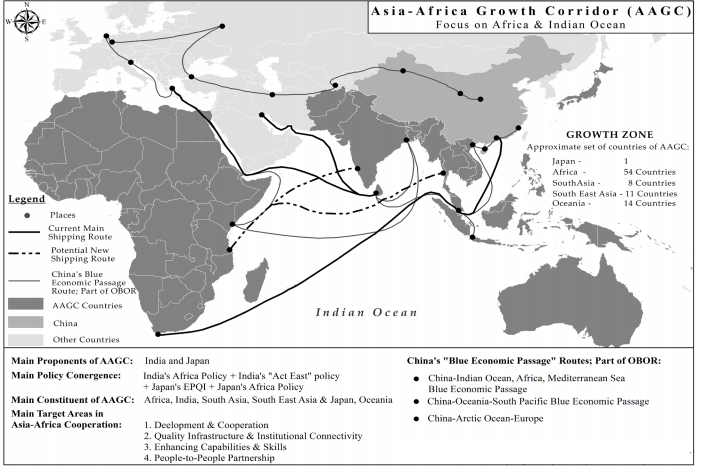International Relations
Development In India-Africa Ties
- 05 Jun 2020
- 7 min read
This article is based on “Drawing closer in crisis” which was published in The Indian Express on 29/05/2020. It talks about leveraging opportunities to develop India-Africa ties.
The Covid-19 pandemic has been one of the worst humanitarian and economic crisis faced by the world, but its effects stand to be much more devastating, particularly for Africa, where economic and public health conditions are extremely vulnerable.
In the 21st century, Africa has transformed from a lost continent to a continent of hope. Subsequently, in recent years, Africa occupies a central place in the Indian government’s foreign and economic policy.
In the context of the current crisis, India has demonstrated its willingness and capacity to shoulder more responsibility in cooperating with Africa to recover from the current crisis and lend support in its overall growth.
This may act as a testament to India’s status as a responsible and reliable global stakeholder.
India’s Developmental Efforts in Africa
- Support in Fight Against Covid-19: Under the e-ITEC initiative, India has shared Covid-19 management strategies, training webinars exclusively aimed at training health-care professionals from Africa by Indian health experts.
- India is also sending consignments of essential medicines, including hydroxychloroquine (HCQ) and paracetamol, to many African countries in addition to doctors and paramedics.
- Increasing Political and Economic Engagement: In the last few years, Africa has been the focus of India’s development assistance and also diplomatic outreach, as evident in plans to open 18 new embassies.
- Also, India-Africa trade reached $62 billion in 2018 compared to $39 billion during 2009-10.
- India’s duty-free tariff preferential scheme for Least Developed Nation (LDCs) launched in 2008 has benefited 33 African states.
- Grants in Aid: After South Asia, Africa is the second-largest recipient of Indian overseas assistance with Lines of Credit (LOC) worth nearly $10 billion (nearly 40% of the total LOC globally) spread over 100 projects in 41 countries.
- Capacity Building via E-governance Initiative: India is investing in the capacity building providing more than $1 billion in technical assistance and training to personnel under the Indian Technical and Economic Cooperation (ITEC) program.
- 40% of all training and capacity building slots under the ITEC programme has traditionally been reserved for Africa.
- India has also invested $100 million in the Pan-African E-Network to bridge the digital divide in Africa, leveraging its strengths in information technology.
- Security Cooperation: Approximately 6,000 Indian soldiers are deployed in UN peace-keeping missions in conflict zones in Africa.
- Cooperation on Multiple Fronts: Bilateral cooperation includes solar energy (Cooperation in International Solar Alliance) development, information technology, cybersecurity, maritime security, disaster relief, counter-terrorism and military training.
Opportunities In India-Africa Relations
- Addressing Food security: Agriculture and food security can also be a fulcrum for deepening ties.
- Africa has a major chunk of the world’s arable land but produces a very small percentage of the global agri-output.
- India has proven expertise in the agriculture sector, being the top producer of much agricultural produce.
- Thereby, India and Africa both can cooperate in ensuring food and nutritional security for each other.
- Becoming Voice of Developing World: Just as India and Africa fought colonialism together, both can now collaborate together for a just, representative and democratic global order that has a voice for around one-third of humanity that lives in Africa and India.
- Combating Neo-Colonialism: China has been actively pursuing Chequebook and donation diplomacy in Africa.
- However, Chinese investment is seen as neo-colonial in nature as it focuses on money, political influence, hard-infrastructure projects and resource extraction.
- India’s approach, on the other hand, is one that focuses on building local capacities and an equal partnership with Africans and not merely with African elites concerned.
- In this context, though Africa has been actively engaged with China, it wants India to act as a balancer and net security provider.
- Enabling Strategic Convergence: Under the recent Quad Plus initiative whereby the countries (US, India, Japan and Australia have recently engaged other countries such as South Korea, Vietnam, New Zealand, Israel and Brazil) exchanged views and proposed cooperation with select African countries about the Indian Ocean.
- Both India and Japan share a common interest in forging a partnership for Africa’s development through the Asia-Africa Growth corridor.
- In this context, India can leverage its global status to establish Africa on the strategic map of global politics.
- Preventing Global Rivalries: In recent years, several global economic players have strengthened their engagement with African states, with an eye to rising economic opportunities, including in energy, mining, infrastructure and connectivity.
- As global engagement in Africa increases, India and Africa can ensure that Africa does not once again turn into a theatre of rival ambitions.
Conclusion
India has an intrinsic interest in helping Africa achieve progress. The spirit of “developing together as equals” defines this bilateral partnership. A resurging Africa and a rising India can give a strong impetus to South-South Cooperation, especially when it comes to addressing challenges in areas like clean technology, climate-resilient agriculture, maritime security, connectivity, and Blue economy.
|
Drishti Mains Question “The pandemic is a colossal challenge but it may create fresh opportunities to bring India and Africa closer together” Discuss. |
This editorial is based on “Seven to eleven: On India and G-7” which was published in The Hindu on June 4th, 2020. Now watch this on our Youtube channel.







